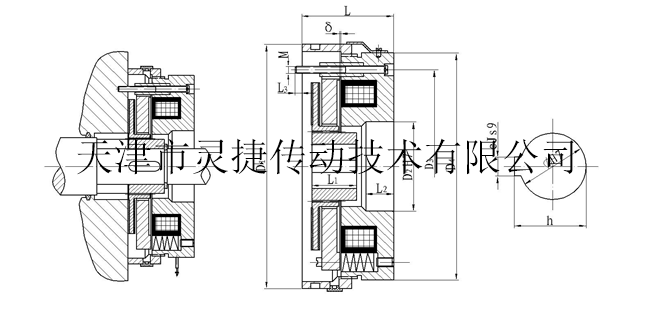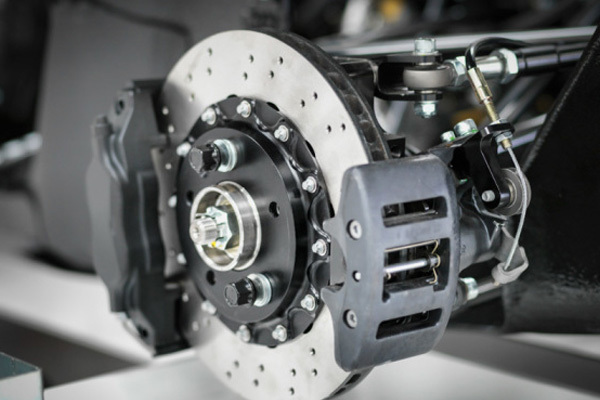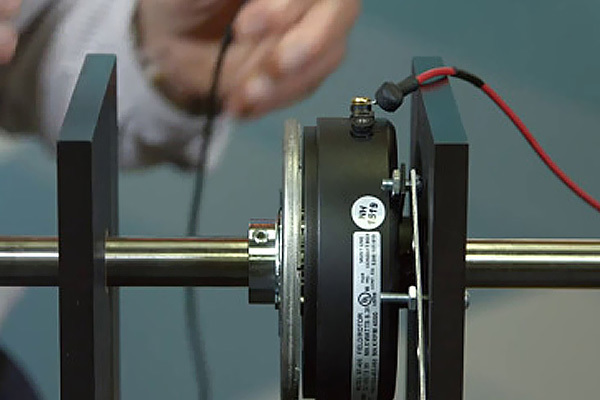
Share
- Details
-
Detailed explanation of 1. electromagnetic power-off brake (power-off brake): Special customization is required. It is composed of yoke body, excitation coil, spring, brake disc, armature, gear sleeve, manual release device, etc. The electromagnetic power-off brake is an electromagnetic pull-in when energized. When the power is off, the spring is pressurized to realize friction braking. It is mainly used for small and light motors such as micro motors, servo motors, stepping motors, and electric forklift motors.
The working principle of the 2. electromagnetic power-off brake (power-off brake): After the coil is powered off, under the action of the spring force, friction is generated between the friction disc, the base (or connecting plate), and the armature, and then the drive shaft is driven by the gear sleeve After the coil is energized, the armature is attracted to the magnetic roller under the action of electromagnetic force, which in turn loosens the friction disc to achieve the purpose of releasing the brake.
3. electromagnetic power-off brake (power-off brake) features: simple and compact structure, low heat and low noise, convenient installation, wide adaptability, low noise, high working frequency, sensitive action, reliable braking and fast speed.
4. electromagnetic power-off brake (power-off brake) uses and applications: suitable for metallurgy, machine tools, packaging, construction, chemical industry, food, stage, elevators, ships and other machinery as well as in the power-off (anti-risk) braking and other occasions, to achieve fast parking, accurate positioning, safety braking and other purposes.
Electromagnetic power-off brake (power-off brake) has the advantages of compact structure, convenient installation, wide adaptability, low noise, high working frequency, sensitive action, and reliable braking. It is an ideal automatic actuator. It is widely used in metallurgy, construction, chemical industry, food, machine tools, printing, packaging and other mechanical equipment, and in the event of power failure (risk prevention) braking and other occasions.Electromagnetic power loss brake is widely used in metallurgy, construction, chemical industry, food, machine tools, printing, packaging and other machinery, and in the power failure (anti-risk) braking and other occasions. This kind of brake has the advantages of compact structure, convenient installation, wide adaptability, low noise, high working frequency, sensitive action, reliable braking, etc., and is an ideal automatic actuator.
An electric motor is a device that converts electrical energy into mechanical energy. The starting process of the motor will undergo a state transition from static to dynamic; after the motor is powered off during operation, it will undergo a transition from dynamic to static due to inertia. Most equipment has no requirement for the length of time from moving to static, but some equipment such as elevators, cranes, automated production lines, etc. must be stopped within a very short period of time after power failure, which introduces our topic today, motor brake control.
The braking control of the motor is completed by the electromagnetic power-off brake, which is divided into two categories: power-on brake and power-off brake. The power-on brake is used for braking occasions requiring precise positioning, and the power-off brake is used for occasions where the equipment must be reliably stopped after power failure: that is, if the equipment cannot be stopped in time after power failure, it will cause casualties, equipment damage, product scrapping and other serious accidents that endanger safe production.
The working mechanism of the electromagnetic power-off brake is that the brake does not restrict the shaft when the motor is powered on, and when the motor is powered off or the motor is powered off for any reason, the brake function is activated, the motor shaft is locked, and the motor rotor is realized in a short time The motor rotor is converted from dynamic to static, and the equipment is transferred to a reliable parking state.
The motor brake is an electromagnetic brake, which is composed of three parts: excitation, magnetic conductivity, guidance and reset linear motion mechanism. Specific to the power-off electromagnetic brake for motors, there are parts such as yokes, excitation coils, springs, brake discs, armatures, splines and spline sleeves, and screws for installation and locking.
Main performance parameters
Main Technical DataSpecifications Model
0.6
1.2
2.5
5
10
20
40
Rated Torque
6
12
26
50
100
200
400
Rated voltage Rated Voltage D.C.V
96
96
96
96
96
96
96
Coil power (20 ℃)W
25
40
58
59
83
129
196
Max Allowed Speed( r/min)
3000
3000
3000
3000
3000
3000
3000
Note: the rated working voltage can be specially ordered by the user
Note:The fixed working voltage may by the user special ordersInstallation Schematic
Installation Diagram
Shape and installation dimensions
Shape and Installation DimensionsSpecifications Model
Radial Dimensions
Axial Dimensions
D1
D2
D3
D4
Φ
h
e
L
L1
L2
L3
M
Δ
0.6
97.5
28
72
86
10
11.40 0.1
3
35.3
20
8.5
5
33M4
0.3
1.2
113.5
42
90
104.5
20
22.80 0.1
6
40.7
20
10
6
33M5
0.35
2.5
142.5
47
112
131.5
20
22.80 0.1
6
44.5
25
15
8
33M6
0.4
5
164.5
55
124
146
25
28.30 0.2
8
58
30
15
8
33M6
0.45
10
198
80
156
183
30
33.30 0.2
8
68.2
35
20
12
33M8
0.5
20
219
85
175
201
40
43.30 0.2
12
74.2
35
20
9
63M8
0.6
40
274
100
215
255
50
53.80 0.2
14
95.6
50
31
12
63M8
0.8
DHM4 electromagnetic power-off brake
Classification
Keyword
Electromagnetic power-loss clutch
- Details
-
Detailed explanation of 1. electromagnetic power-off brake (power-off brake): Special customization is required. It is composed of yoke body, excitation coil, spring, brake disc, armature, gear sleeve, manual release device, etc. The electromagnetic power-off brake is an electromagnetic pull-in when energized. When the power is off, the spring is pressurized to realize friction braking. It is mainly used for small and light motors such as micro motors, servo motors, stepping motors, and electric forklift motors.
The working principle of the 2. electromagnetic power-off brake (power-off brake): After the coil is powered off, under the action of the spring force, friction is generated between the friction disc, the base (or connecting plate), and the armature, and then the drive shaft is driven by the gear sleeve After the coil is energized, the armature is attracted to the magnetic roller under the action of electromagnetic force, which in turn loosens the friction disc to achieve the purpose of releasing the brake.
3. electromagnetic power-off brake (power-off brake) features: simple and compact structure, low heat and low noise, convenient installation, wide adaptability, low noise, high working frequency, sensitive action, reliable braking and fast speed.
4. electromagnetic power-off brake (power-off brake) uses and applications: suitable for metallurgy, machine tools, packaging, construction, chemical industry, food, stage, elevators, ships and other machinery as well as in the power-off (anti-risk) braking and other occasions, to achieve fast parking, accurate positioning, safety braking and other purposes.
Electromagnetic power-off brake (power-off brake) has the advantages of compact structure, convenient installation, wide adaptability, low noise, high working frequency, sensitive action, and reliable braking. It is an ideal automatic actuator. It is widely used in metallurgy, construction, chemical industry, food, machine tools, printing, packaging and other mechanical equipment, and in the event of power failure (risk prevention) braking and other occasions.Electromagnetic power loss brake is widely used in metallurgy, construction, chemical industry, food, machine tools, printing, packaging and other machinery, and in the power failure (anti-risk) braking and other occasions. This kind of brake has the advantages of compact structure, convenient installation, wide adaptability, low noise, high working frequency, sensitive action, reliable braking, etc., and is an ideal automatic actuator.
An electric motor is a device that converts electrical energy into mechanical energy. The starting process of the motor will undergo a state transition from static to dynamic; after the motor is powered off during operation, it will undergo a transition from dynamic to static due to inertia. Most equipment has no requirement for the length of time from moving to static, but some equipment such as elevators, cranes, automated production lines, etc. must be stopped within a very short period of time after power failure, which introduces our topic today, motor brake control.
The braking control of the motor is completed by the electromagnetic power-off brake, which is divided into two categories: power-on brake and power-off brake. The power-on brake is used for braking occasions requiring precise positioning, and the power-off brake is used for occasions where the equipment must be reliably stopped after power failure: that is, if the equipment cannot be stopped in time after power failure, it will cause casualties, equipment damage, product scrapping and other serious accidents that endanger safe production.
The working mechanism of the electromagnetic power-off brake is that the brake does not restrict the shaft when the motor is powered on, and when the motor is powered off or the motor is powered off for any reason, the brake function is activated, the motor shaft is locked, and the motor rotor is realized in a short time The motor rotor is converted from dynamic to static, and the equipment is transferred to a reliable parking state.
The motor brake is an electromagnetic brake, which is composed of three parts: excitation, magnetic conductivity, guidance and reset linear motion mechanism. Specific to the power-off electromagnetic brake for motors, there are parts such as yokes, excitation coils, springs, brake discs, armatures, splines and spline sleeves, and screws for installation and locking.
Main performance parameters
Main Technical DataSpecifications Model
0.6
1.2
2.5
5
10
20
40
Rated Torque
6
12
26
50
100
200
400
Rated voltage Rated Voltage D.C.V
96
96
96
96
96
96
96
Coil power (20 ℃)W
25
40
58
59
83
129
196
Max Allowed Speed( r/min)
3000
3000
3000
3000
3000
3000
3000
Note: the rated working voltage can be specially ordered by the user
Note:The fixed working voltage may by the user special ordersInstallation Schematic
Installation Diagram
Shape and installation dimensions
Shape and Installation DimensionsSpecifications Model
Radial Dimensions
Axial Dimensions
D1
D2
D3
D4
Φ
h
e
L
L1
L2
L3
M
Δ
0.6
97.5
28
72
86
10
11.40 0.1
3
35.3
20
8.5
5
33M4
0.3
1.2
113.5
42
90
104.5
20
22.80 0.1
6
40.7
20
10
6
33M5
0.35
2.5
142.5
47
112
131.5
20
22.80 0.1
6
44.5
25
15
8
33M6
0.4
5
164.5
55
124
146
25
28.30 0.2
8
58
30
15
8
33M6
0.45
10
198
80
156
183
30
33.30 0.2
8
68.2
35
20
12
33M8
0.5
20
219
85
175
201
40
43.30 0.2
12
74.2
35
20
9
63M8
0.6
40
274
100
215
255
50
53.80 0.2
14
95.6
50
31
12
63M8
0.8
Product inquiry

The company has a product research and development department composed of experts, senior engineers and other professional and technical personnel. It is engaged in research and development and has perfect research and development test equipment. At present, the products reach more than 100 series of nearly 1,000 specifications, and the force distance ranges from 0.1N. m ~ 250000N.m. The company has been rated as a high-tech enterprise by the state for more than ten consecutive years, and a number of R & D projects have been established locally and have received municipal financial support.
Service Hotline:
Sales Department: Xu Jie
Sales Phone:+86-22-26616372, +86-22-26341260, +86 13920613215
Fax: 86-022-26616580
Market Development Department: Li Shuo
Marketing Department Telephone:+86-22-26614130
Technology Department: Yue Chao
Technical Department Telephone:+86-22-26222775 ,+86 18602228435
QQ:1059237223 1611412939
Company Website:www.tjlhq.com
Enterprise E-mail:xzm@tjlhq.com
Company address: No.6, Zone B, South Jifeng Road, Hongcang City Industrial Park, Yanji Daohong, Beichen District, Tianjin




